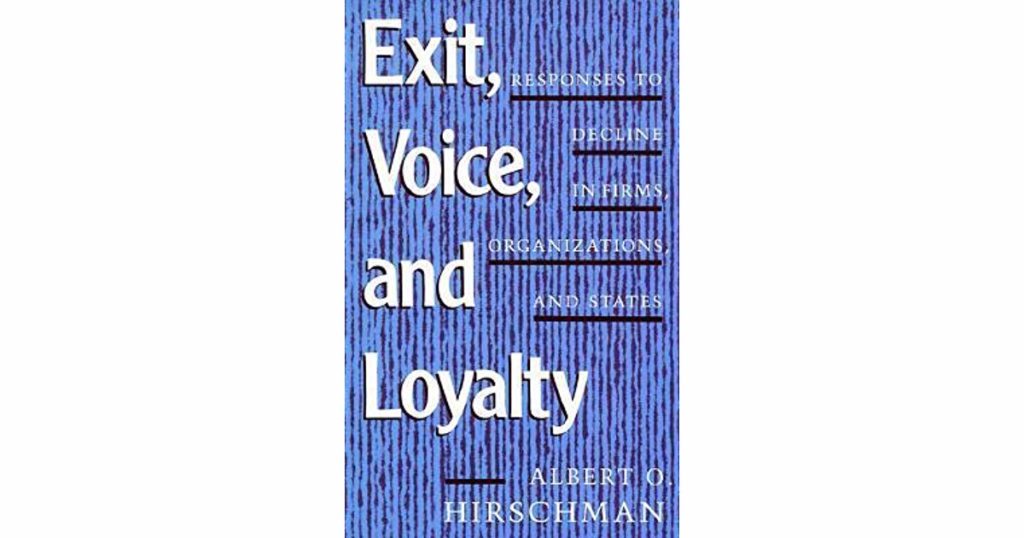Exit, Voice, and Federalism: The Prerogative of Mobility
Americans can “vote with their feet” when they move to another state
This essay originally appeared in Law & Liberty on November 11, 2019 (here) as “Exit Stage Right.” Thanks to Power Line blog and Instapundit (here) for the links! And Real Clear Policy (here). Thanks also to the Des Moines Register (here).
I have been quiet lately due to a major move—my second in seven years. Relocating is a daunting task, one that seems to become more difficult later in life, if only due to inertia and the accumulation of “stuff.” Travails can sometimes be a “teaching moment,” and so it is here. My recent moves–from California to Texas, and now to Tennessee—illustrate one of the benefits of federalism. In the vernacular of noted sociologist Albert O. Hirschman, [1] when it became clear that my political “voice” was irrelevant in the progressive enclaves of southern California and then Austin, I decided to exercise the prerogative of mobility inherent in our federal system: I voted with my feet and exited to more congenial environs.

Residents of high-tax, poorly-governed, and liberal-dominated states, such as California, Illinois, and New York, increasingly relocate elsewhere, often to the Sunbelt. People relocate for a variety of reasons. Approximately 40 million Americans move each year, a decision that used to be driven mainly by climate considerations (residents of the Snow Belt—especially retirees–seeking warmer weather), but more and more Americans migrate internally for economic reasons (lower taxes, a better job market, and cheaper housing). Some, like me, are political refugees—escaping partisan hegemony in their home state that runs contrary to their preferences. In all these respects, mobility enables Americans to improve their well-being by pursuing more attractive opportunities elsewhere in this magnificent, sprawling country.
Jurisdictions depend on taxpayers to finance government operations, and losing too many residents to more attractive destinations can have adverse consequences to states exhibiting significant outbound migration. When excessive regulation, progressive policies, and high taxes drive residents to move to other states, a form of interstate competition is at work. States with sensible regulations and low taxes (such as Texas, Arizona, and Florida) draw productive taxpayers at the expense of the failed blue states. Businesses often relocate for similar reasons. Not only do the shrinking states lose jobs, human capital, and tax revenues, internal population shifts can lead to the loss of congressional seats in reapportionment. In theory, this serves as a constraint on dysfunctional governance at the state and local level, but accountability is elusive, bailouts and excuses are pervasive, and elective politics are an imperfect “market.”
Residents who relocate for political reasons—leaving a state in which they were in the minority, consistently outvoted by the majority—can improve their level of psychic satisfaction by settling in a congenial polity. This phenomenon was the subject of a 2008 book, The Big Sort. At the end of my 30 years of residence in California, and later in Austin, I felt largely disenfranchised by the political process. I was so outnumbered by liberal Democrats that my vote (my “voice” in Hirschman’s parlance) didn’t matter. I felt alienated.
Not only did my preferred candidates usually lose, but I was regarded as an outlier in my neighborhood for daring to have a pro-Republican yard sign. In ultra-liberal Austin, my neighbors viewed my support for Ted Cruz over Beto O’Rourke for Senate in 2018 as an anti-social act, and prompted cold
stares and even hostile comments from these smug progressives. Fear of having my car vandalized made displaying even innocuous bumper stickers out of the question. To avoid harassment, the badly outnumbered conservatives in Austin are forced to go underground—like being behind enemy lines.

As Milton Friedman noted in Capitalism and Freedom, the simple arithmetic of democracy favors subsidiarity: the smaller the unit of government, the fewer voters who “lose” in the majoritarian political process. Moreover, despite the significant transaction costs associated with relocation (movers, real estate commissions, closing costs), it is far easier to move from one city to another, or even from one state to another, to avoid an unpalatable political climate, than it is to move to another country. Few people wish to become expatriates.
Todd Zywicki succinctly summarized Friedman’s argument in Law & Liberty:
Federalism protects liberty by enabling us to exit jurisdictions that provide services inefficiently to others but…the threat of exit itself may constrain government behavior. By contrast, it is very difficult to exit when Washington acts—which Friedman notes is precisely why many of those on the left prefer national action.
Importantly, federalism also minimizes electoral “disappointment”—a political counterpart to consumer welfare. A conservative Republican will find his vote “cancelled” less often (or not at all) in a state comprised of a likeminded majority, and the same principle applies for liberal Democrats. This is the genius of federalism. Mobility—the essence of the freedom of association—can reduce political discord. Americans hold widely-varying opinions on a host of topics: abortion, public safety, economic regulation, traditional morality, and the ideal amount of government spending, to cite just a few examples. Some voters support abortion on demand, late-term abortions, taxpayer-funded abortion, and abortion for minors without parental consent. Others oppose all those things. A national policy will satisfy some factions but leave a large number bitterly disappointed.
For instance, if abortion was regulated entirely at the state level (as it was prior to Roe v. Wade in 1973), voters in each state could decide what policy to adopt. Some states would outlaw it altogether, others would aggressively promote it, and many would enact policies somewhere in the middle. Voters who were resolutely pro-life could move to a state that reflected their views (if they did not already reside in such a place), and the same is true for resolutely pro-choice voters. The overall number of disgruntled voters could be reduced. Justice Louis Brandeis described the role of states within the patchwork quilt of federalism as the “laboratories of democracy.”
Federalism teaches that unless policies are expressly forbidden by the U.S. Constitution, states ought to be permitted to “experiment” as they wish. Political differences among the states are inevitable, and even desirable. California does not have to resemble Texas (or Utah, or Oklahoma), and vice versa. Ardent progressives are free to enact policies at the state and local level, even if they seem quite radical, and even if they produce deleterious consequences.
Unlike Brandeis, a Progressive who favored state and local initiatives, the modern Left typically pushes for national policy initiatives, at the federal level, in order better to disguise the disastrous consequences, and to prevent disgruntled citizens from fleeing the resulting failures. Liberals, like socialists, abhor competition because it reduces the control of central planners. So far, progressives have had to settle for piecemeal implementation of their disastrous social justice agenda, beginning with left-leaning urban centers.
The policies regarding homelessness in Los Angeles, San Francisco, and Seattle are examples, and much of the crime problem in cities such as Chicago and Baltimore is attributable to lax policing and law enforcement. Yet, unless reined in by the state legislature, local governments are responsible only to local voters. In a democracy, the voters determine who will represent them, and how. Objectors unable to affect the outcome of elections can move, as I did when I abandoned California and Austin.

Alas, the mobility inherent in federalism is not an unalloyed blessing. As objectors leave a jurisdiction, such as California, it tends to become more insular and monolithic. In the 2016 presidential election, Hillary Clinton carried California by over 30 points, a lopsided 2-to-1 margin of victory in which Clinton defeated Donald Trump by over 4.2 million votes. This, in a state that twice elected Ronald Reagan governor! Through out-migration and otherwise, the Golden State has changed dramatically in recent decades.
The overwhelmingly Democratic electorate in California is not so much a sober check on elected officials as a cheering section for trendy policies. (Due to the state’s non-partisan “open primary,” in which the top two vote-getters proceed to the general election, regardless of party affiliation, there is often no Republican candidate on the ballot for statewide office. For instance, when Kamala Harris ran for the U.S. Senate in 2016, her opponent was another Democrat, not a Republican.) Without any significant opposition, Democrats’ proposals do not face meaningful scrutiny and debate. In politics, as in economics, competition improves the outcome.
In lopsided urban enclaves, such as New York City, the influence of special interests (e.g., public employee unions) is increased. As middle-class whites flee deteriorating cities (such as Detroit, Chicago, Baltimore, and Flint), the quality of municipal governance generally declines. Chaos and corruption often increase. Once a city or state achieves maximum “wokeness,” laissez-faire policies toward criminality (including declarations of “sanctuary” status for undocumented immigrants) jeopardize public safety and accelerate the exodus of residents concerned about rising lawlessness. These demographic shifts, once implemented, are difficult to reverse.

In the past, most Americans lived and died within a 50-mile radius of their place of birth. They had longstanding, familial ties to their community and were invested in its long-term success. Hirschman called this “loyalty.” When people disagreed with their neighbors, they typically did so without rancor or spite. An increasingly mobile populace can get up and move at will—and often does. This is “exit.” The result may be an increasingly-polarized national electorate, separated into solidly “red” and “blue” states, with a few hotly-contested “purple” ones dictating the outcome of presidential elections.
In partisan strongholds there is less meaningful “voice” than there used to be; social media and cable news fuel the creation of ideological silos, discourse is often replaced with denunciation, and neighbors—within the self-segregated homogeneous enclaves enabled by fluid political migration—no longer seek middle ground. Extreme polarization strains the national fabric and frustrates the goal of unity—E pluribus unum.
Notwithstanding these caveats, federalism is a key check on government power. My only regret about moving to Tennessee is that I didn’t do it sooner.
[1] Hirschman’s influential book, Exit, Voice, and Loyalty: Responses to Decline in Firms, Organizations, and States, was published in 1970.































